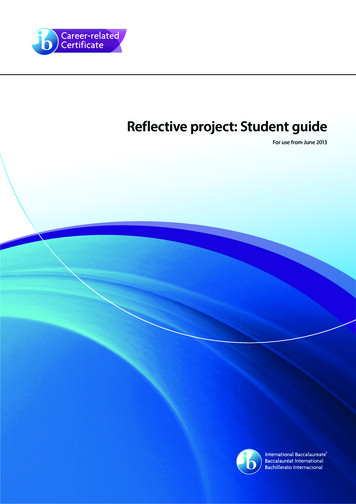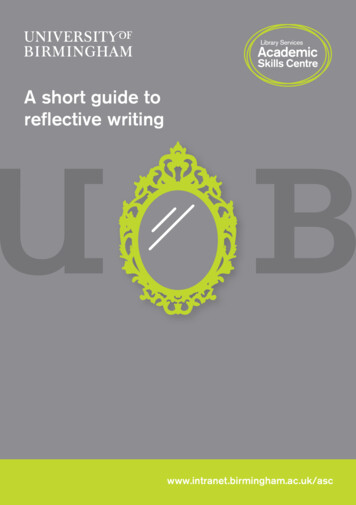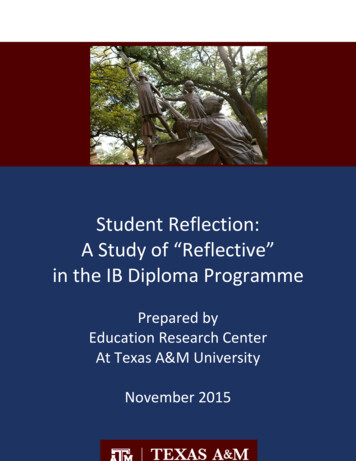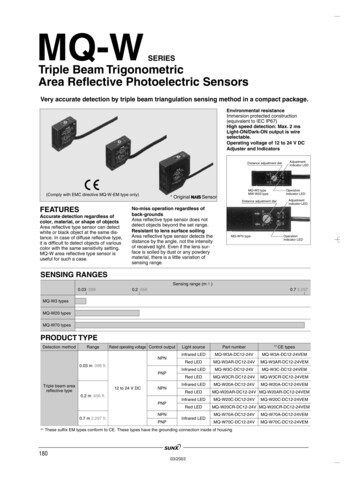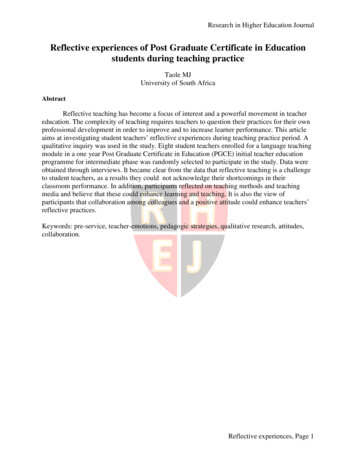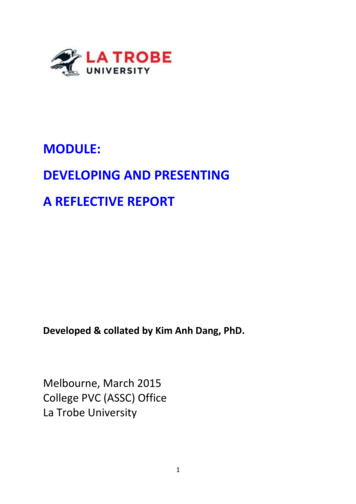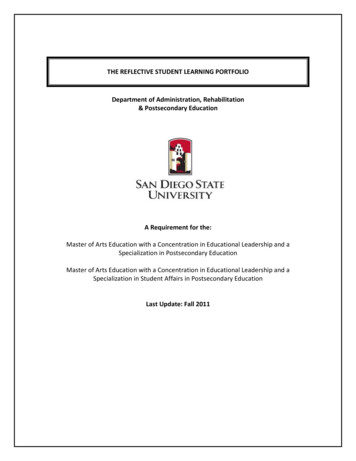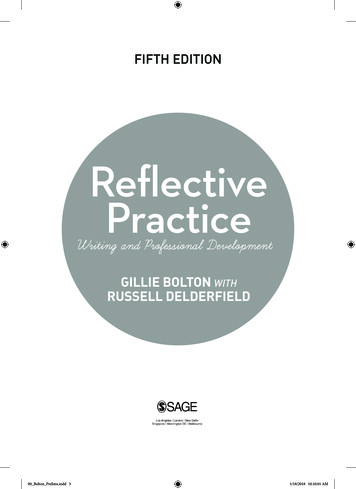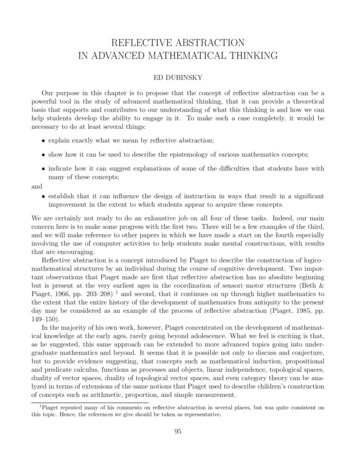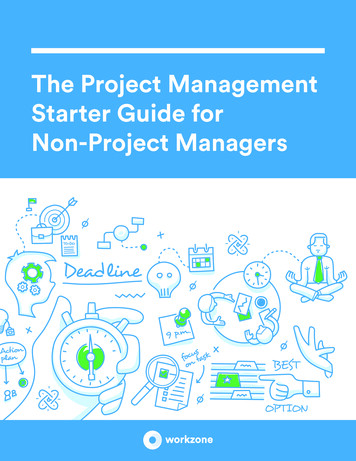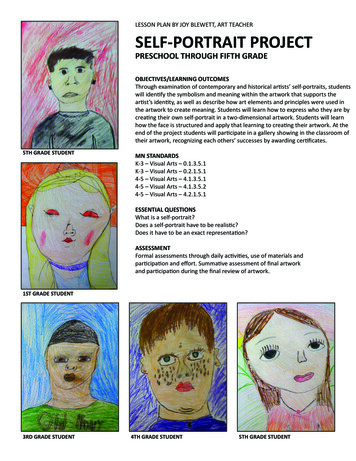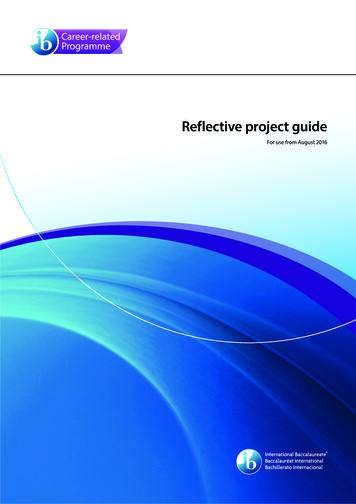
Transcription
Reflective project guideFor use from August 2016
Reflective project guideFor use from August 2016
Career-related ProgrammeReflective project guidePublished December 2015Updated August 2016Published byInternational Baccalaureate Organization15 Route des Morillons1218 Le Grand-SaconnexGeneva, SwitzerlandRepresented byIB Publishing Ltd, Churchillplein 6, The Hague, 2517JW The Netherlands International Baccalaureate Organization 2015The International Baccalaureate Organization (known as the IB) offers four high-qualityand challenging educational programmes for a worldwide community of schools, aimingto create a better, more peaceful world. This publication is one of a range of materialsproduced to support these programmes.The IB may use a variety of sources in its work and checks information to verify accuracyand authenticity, particularly when using community-based knowledge sources such asWikipedia. The IB respects the principles of intellectual property and makes strenuousefforts to identify and obtain permission before publication from rights holders of allcopyright material used. The IB is grateful for permissions received for material usedin this publication and will be pleased to correct any errors or omissions at the earliestopportunity.All rights reserved. No part of this publication may be reproduced, stored in a retrievalsystem, or transmitted, in any form or by any means, without the prior written permissionof the IB, or as expressly permitted by law or by the IB’s own rules and policy. Seewww.ibo.org/copyright.IB merchandise and publications can be purchased through the IB store atstore.ibo.org.Email: sales@ibo.orgInternational Baccalaureate, Baccalauréat International and Bachillerato Internacionalare registered trademarks of the International Baccalaureate Organization.
IB mission statementThe International Baccalaureate aims to develop inquiring, knowledgeable and caring young people whohelp to create a better and more peaceful world through intercultural understanding and respect.To this end the organization works with schools, governments and international organizations to developchallenging programmes of international education and rigorous assessment.These programmes encourage students across the world to become active, compassionate and lifelonglearners who understand that other people, with their differences, can also be right.
ContentsContentsIntroduction1About this guide1Principles of the Career-related Programme core2Aims of the Career-related Programme core3Ethical education4Approaches to teaching and approaches to learning5Assessment in the Career-related Programme6The reflective project7Nature of the reflective project7Overview of the reflective project9Details of the reflective project11Options for the reflective project12Process for the reflective project15Reflection17Roles and responsibilities18Roles and responsibilities18The school’s responsibilities19The supervisor’s responsibilities20The students’ responsibilities24Academic honesty25Academic honesty25Ethical guidelines for the reflective projectEthical guidelines for the reflective projectAssessment in the reflective project262627Assessment in the reflective project27Assessment objectives28Marking29Reflective project criteria31Clarification and explanation of the criteria36Reflective project guide
Course review46Course review46Programme evaluation47Programme evaluation47Learning diversity48Learning diversity48Appendices49Appendix 1—Explanation of key terms49Appendix 2—Examples of reflective projects51Appendix 3—How to use the researcher’s reflection space52Appendix 4—Reflections on planning and progress form53xReflective project guide
IntroductionAbout this guidePurposeThis guide is intended to support the planning and organization of the reflective project, one of thecomponents of the IB Career-related Programme (CP) core. It is written primarily for the teacher/supervisor/CP coordinator and is also expected to inform school staff members.What it includesThe guide is divided into the following sections: Introduction The reflective project Roles and responsibilities Academic honesty Ethical guidelines for the reflective project Assessment in the reflective project Course review Programme evaluation Learning diversity AppendicesFurther resourcesThe CP website offers resources for all four core components. There are additional resources—for example,web pages, books, videos, journals and teaching ideas—in the CP forum resource section.AcknowledgmentThe IB wishes to thank the educators and associated schools for generously contributing time and resourcesto the production of this guide.Reflective project guide1
IntroductionPrinciples of the Career-related Programme coreThe following principles must be followed by schools offering the Career-related Programme: The IB provides the curriculum and assessment framework for the programme’s core components. Schools determine the nature of the delivery of the programme’s core components. A teaching and learning philosophy that forms the basis of delivery for all core components is outlinedin What is an IB education? Schools determine their own assessment for personal and professional skills, language developmentand service learning. Schools will assess the reflective project based on the assessment criteria determined by the IB; asample of the school’s reflective projects will be moderated by the IB. Schools are responsible for the health and safety of students and staff involved in the programme.2Reflective project guide
IntroductionAims of the Career-related Programme coreDrawing on the attributes of the learner profile, the core of the programme aims to develop students whoare: thoughtful and active citizens responsible for their own learning and development competent and confident communicators reflective, creative and critical thinkers aware of our shared human condition able to establish a sense of identity in a context of time and place prepared to think about the needs, values and perspectives of other people active participants in their own intercultural learning.Reflective project guide3
IntroductionEthical educationThe Career-related Programme provides an excellent opportunity for ethical education conceived asinvolving principles, attitudes and codes of behaviour. While ethical principles are also embodied in the IB’smission statement and learner profile, the programme’s core emphasis is on helping students to developtheir own identities and beliefs.Various ethical issues will arise, either implicitly or explicitly, in the course of the programme’s activities, forexample as challenges to students’ ideas, instinctive responses or ways of behaving. Schools have a specificresponsibility to help students think, feel and act their way through ethical issues, particularly in view of thereflective project. Utilizing the personal and professional skills course for the exploration and application ofethics will support students’ understanding of ethics.4Reflective project guide
IntroductionApproaches to teaching and approaches to learningApproaches to teaching and approaches to learning sit within the inner circle of the Career-relatedProgramme model as they are within the models for all IB programmes. These approaches refer to thestrategies, skills and attitudes that permeate the teaching and learning environment. They are closelylinked with the learner profile attributes and aim to enhance student learning and prepare students forassessment and beyond.Approaches to teaching and approaches to learning are also linked to the development of internationallyminded students, a central aim of all IB programmes. Education for international-mindedness “relies on thedevelopment of learning environments that value the world as the broadest context for learning” (What isan IB Education? 2013).Effective approaches to learning in the CP should therefore be developed within global contexts, withparticular attention being given to promoting three key elements—global engagement, multilingualismand intercultural understanding.There are clear connections between the core components and the approaches to teaching and approachesto learning. A package of resources (https://ibpublishing.ibo.org/dpatl/) has been developed to supportapproaches to teaching and approaches to learning in the Diploma Programme (DP) that can be anextremely useful source of guidance for teachers and coordinators in the design and delivery of the corecomponents.Reflective project guide5
IntroductionAssessment in the Career-related ProgrammeTeachers are encouraged to develop their own assessment criteria for all core components except thereflective project, depending on the context of the assessment, the student and the course.The form of assessment should vary and teachers must ensure that students are explicitly aware of what isexpected and that measurement of their achievements is valid, reliable, consistent, authentic and fair.Monitoring progressPerformance across the core components should be included in a student’s school report to provide arecord of their progress. This can take many different forms, yet as its basis it should provide a way of clearlycommunicating to students, parents and educational institutions the student’s engagement with the corecomponents.At the end of the Career-related Programme, schools should provide students with a summative statementof their achievements, which they can use for post-secondary applications.Completion of core componentsSchools must report to the IB whether a student has satisfactorily completed the requirements for the corecomponents of language development, service learning and personal and professional skills and the gradeawarded for the reflective project.A school’s provision for core components will be monitored by the IB.6Reflective project guide
The reflective projectNature of the reflective projectThe reflective project is one of the four compulsory components of the IB Career-related Programme (CP) core.The reflective project is an in-depth body of work produced over an extended period of time and submittedtowards the end of the CP. It is the product of the students’ own initiative and should reflect their personalexperience of the CP. The reflective project is intended to promote high-level research, writing and extendedcommunication skills, intellectual discovery and creativity through a variety of different approaches.Schools are encouraged to help students to recognize and make use of the links between all strands of theirCP in order that the reflective project can be a formal representation of their studies overall.The reflective project focuses on an ethical dilemma of an issue directly linked to the student’s career‑related study.In addition to a written essay (see Options), students keep a record of their reflections on the process ofundertaking and completing the reflective project using the Reflections on planning and progress form(RPPF). This record forms part of the final reflective project assessment.AimsThe reflective project aims to give students the opportunity to: produce an extended piece of work engage in personal inquiry, action and reflection on a specific ethical dilemma present a structured and coherent argument engage with local and/or global communities develop research and communication skills develop the skills of critical and creative thinking.Time requiredStudents are expected to devote a minimum of 50 hours to the reflective project.AssessmentThe school assesses all reflective projects. The IB will then select a sample for the school to send to anexternal moderator for confirmation of the school’s marks.Reflective project guide7
Nature of the reflective projectStudents will be assessed on two aspects of the project: the approach they use to complete the reflective project—the process the output from that process—the product.The reflective project is assessed using five assessment criteria designed to foster independent study andencourage students to use their own initiative.8Reflective project guide
The reflective projectOverview of the reflective projectThis section covers all the main aspects of the reflective project that a teacher introducing it will need toconsider: Reflective project within the CP Requirements The career-related context Links with the personal and professional skills course The international dimensionReflective project in the CPThe reflective project encapsulates the fundamental elements of the Career-related Programme. It is whatmakes the CP unique and meaningful, and enables students to see the culmination of their programmestrands in formal assessment. It allows formal assessment of students’ development indirectly and directlyin all components of the core as well as their DP courses.RequirementsAll CP students are required to complete the reflective project.Students should be told about the reflective project at the beginning of the CP in order to be thinkingabout, and working on, the reflective project throughout their CP.The career-related contextFrom their career-related study, students identify an issue of interest then explore the ethical dimensionassociated with the issue in order to arrive at a focused ethical dilemma. The reflective project’s primaryfocus is the ethical dilemma embedded within the issue, not the issue itself.Students undertake research and analysis on the chosen ethical dilemma. This research will includeconsultation with the local and/or global community.Linking the reflective project to the career-related studies of students provides a way for them to exploreethical dilemmas in real-life situations.Reflective project guide9
Overview of the reflective projectLinks with the personal and professional skillscourse (PPS)The relationship between the five themes of personal and professional skills and the reflective project isrelevant and useful to st
IB mission statement The International Baccalaureate aims to develop inquiring, knowledgeable and caring young people who help to create a better and more peaceful world through intercultural understanding and respect. To this end the organization works with schools, governments and international organizations to develop challenging programmes of international education and rigorous
